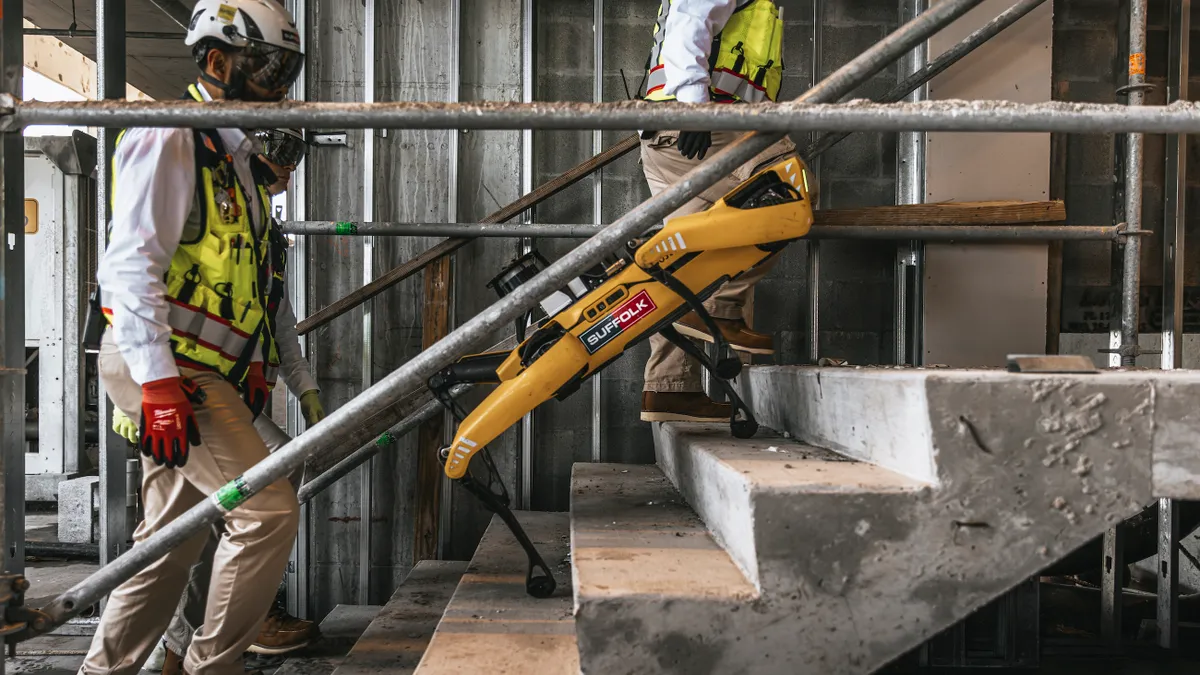This article is part of our six-part series of interviews with women leaders in construction for Women in Construction Week 2017. Read the others here.
Sheryl Palmer didn't set out on her career path with the goal of climbing through the ranks at one of the country's largest homebuilders. But, three decades later, Palmer, now the CEO of publicly traded national builder Taylor Morrison, isn't looking back.
As the only woman CEO among the top 20 homebuilders in the country, according to records kept by Builder, Palmer represents a growing group of women in leadership roles in an industry that has long lacked demographic diversity. The key to her success, she said, is being willing to learn.
"You have to dive in. You can fake it till you make it a little bit, but you’ve got to really understand [the business]," Palmer said. "It's about staying current and finding the balance of being in the day-to-day and having the courage to think out five years so I can make sure that we keep the future in front of us and a path on how to get there."
Construction Dive spoke with Palmer about how she learned the business, the opportunities for women in construction and how members of the industry today can welcome newcomers of all backgrounds.
Editor's note: This interview has been edited and condensed.
How did you get started in the construction industry?
PALMER: I wish I could tell you that it was a planned approach. I went to school to go into special education, and I worked in marketing along the way, including for the advertising agency that had the Del Webb account. They asked me to come inside at the corporate office. Soon after, one of the division presidents asked me to go into sales management. That was in the early 1980s, and I haven’t really looked back. It wasn’t necessarily a planned journey, but once I got there, it was right for me, and I’ve enjoyed it for 30 years.
What was it about the industry that made it right for you?
PALMER: It was the people and the fascinating interconnectedness of the different parts of the business. Back in the ’80s, it was a little different [than it is today]. You didn't talk across departments. I was young enough, naive enough, to say, "Well that doesn't make sense. How can I not get to know these construction guys? They're the ones building the houses for our customers." That had me start creating relationships and learning the different pieces of the business.
What was the reaction by those construction teams to your reaching out from marketing and sales and saying, ‘Hey, I want to know how these homes come together’?
PALMER: You have to have a lot of humility to do it. I don't even think I could read construction drawings back then. The vice president of construction and I started to work together and became friends, and I was like, ‘I don't understand this stuff. Can you help me?’ He’d meet me at 6:30 a.m. and teach me how to read floor plans — "This is a door, that means the door's opening," really basic. Then you start seeing this mutual trust [develop] and it's actually making us better. I think people began to see me as being able to walk into a house and see it different, not worse or better, but to see things that maybe they didn't. It builds on itself.
When I first joined the CEO table in our group, it was kind of like, "What are you going to do? Because we're not used to that." You kind of take them down one at a time, just by being a good person.
What do you mean when you say they were ‘not used to that’?
PALMER: There hadn't been a female at the table before. My approach and the way I think through problems was just different. Initially, people's guards were up because it had always been a very male-dominated industry. I've always approached it as [being about] diversity of thought, and the more kinds and types and backgrounds of people you bring to the table, the more engaging and the better you can problem solve. If you all think things the same way, progress is going to be pretty muted. I don't think they knew what to do with my perspective.
When it comes to that diversity of thought, what did you bring and still bring to the table that you think is unique to you? It sounds like, from your observations, that it to some extent has to do with gender.
PALMER: It shouldn't have to do with gender, so maybe it’s just a bias. I just walked out of a meeting with our vice presidents of sales and of construction from across the country. When we went into Q-and-A, somebody said, ‘You don't understand what it means for us to have a female voice because we just didn't think it could happen.’ Diversity of thought is about being OK to express yourself and her feeling comfortable [to communicate that during the Q-and-A]. I ran from this for a long time. Now, I face with true appreciation the fact that maybe I lead differently because I'm a female. It's not weaker, and emotion and humility are traits that could help anybody in business. It brings a softer touch, and that doesn't mean it's not with business savvy and the ability to get things done or with intellectual curiosity. It's a human touch.
You mentioned that, for a time, you were running from that notion of how you lead as a woman being different. How did you get over it?
PALMER: It was through a lot of great mentors, and those people can be mentors who I aspired [to be like] or have great relations with and respect for, or those can be great people who I worked with.
Speaking about women, specifically, many women in the industry say they often have to take up a persona or perform gender in a certain way. Is that something you've encountered?
PALMER: I have a very strong opinion on that. Don't lose who you are. I have spent a lot of years coaching women who felt they had to be someone different, and when you have to be someone different and you can't be your best you, I think so much is compromised, certainly your self respect, and if you lose that, your ability to lead is compromised. My counsel is to own it and own it proud. Our differences are good. Don't compete by being someone you're not. Compete by being every bit of who you are.
What is your advice for women and people of diverse backgrounds at all levels looking to enter the homebuilding industry?
PALMER: You are the CEO of your career. Act on it. There's nothing wrong with relationships and doors that open, but, at the end of the day, you've got to make it and you've got to want it. Wherever you find that passion, go for it but be open-minded. I went to school to be a teacher and I was so passionate about that until I turned left when I was probably supposed to turn right and stayed flexible and nimble enough until I was grounded in my path. No matter where you are in your career, create relationships, seek to understand, seek knowledge, expose yourself to as much as you can, stay open and then go for it. There's no replacement for hard work.
What advice do you have for people in the industry that represent the ‘old guard’ as far as welcoming newcomers, especially from groups that aren't equally represented in the industry right now.
PALMER: I would ask them to think back in their career on who put their arm around them and helped them get to where they are today. As you have this ‘new guard’ coming in with all the intelligence, history and inherent knowledge, a lifetime of lessons, think about how easy it was if somebody shared that or how easy it wasn't if someone didn't and you had to go through all of those hard knocks yourself. If each leader in our company — and you can be a leader at any level — will embrace that with somebody joining the company, it will be a pretty powerful place.



















